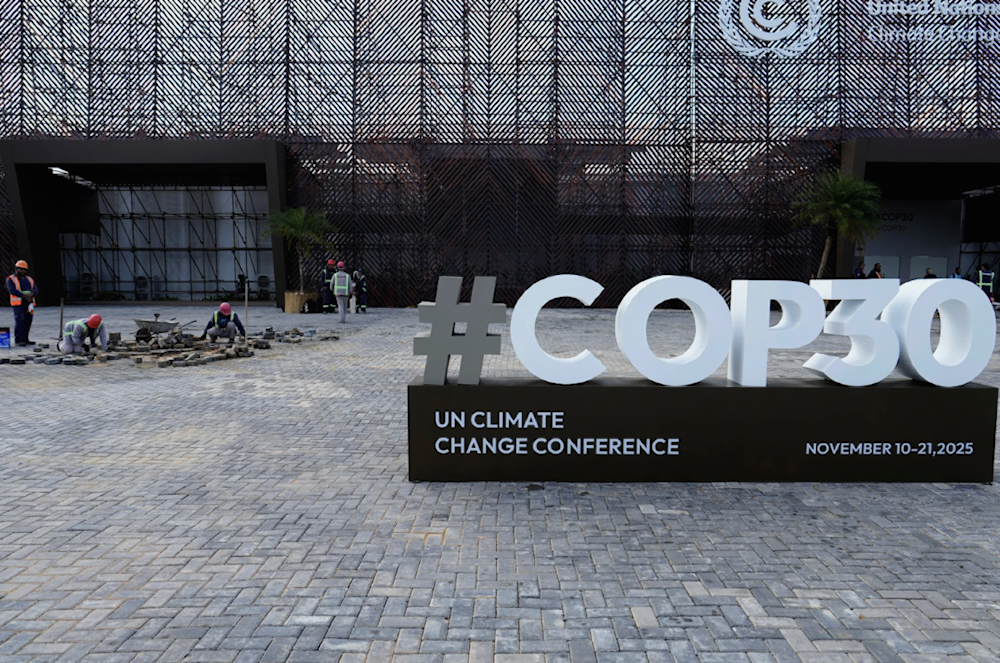COP30 climate summit opens with call for unity
UN climate summit COP30 opens in Brazil with calls for unity amid US absence, growing climate threats, and Indigenous demands for stronger action.
-

A sign for the upcoming COP30 UN Climate Summit sits outside of the press center in Belem, Brazil, Monday, November 3, 2025. (AP)
The COP30 climate summit began Monday in the Amazonian city of Belem with a call for global unity, as United Nations Climate Chief Simon Stiell urged world leaders to collaborate in the fight against climate change rather than clash over differing priorities.
Stiell emphasized that the task at hand is not to "fight one another" but to "fight this climate crisis together." Despite decades of international negotiations helping curb projected temperature increases, Stiell warned that "we have so much more work to do."
The summit opened under a cloud of geopolitical tensions and low expectations for a binding final agreement. Host nation Brazil managed to broker an agenda deal, sidestepping disputes over hot-button topics like climate finance and carbon taxes. Some countries are instead advocating for more focused, consensus-free actions such as halting deforestation.
A recent UN report showed that updated climate pledges could reduce emissions by 12% from 2019 levels by 2035, a slight improvement but still well short of the 60% cut needed to stay within the 1.5°C global warming limit.
Brazilian President Luiz Inacio Lula da Silva criticized climate denial and anti-science rhetoric, warning against efforts to undermine climate action. "They attack the institutions, the science, the universities," he said. "It’s time to impose another defeat to denialists."
Absence of US officials sparks criticism from allies
The absence of US President Donald Trump from COP30 drew criticism from both domestic and international figures. While the US opted not to send a formal delegation, California Governor Gavin Newsom and New Mexico Governor Michelle Lujan Grisham were expected to attend on Tuesday.
Speaking at a global investors summit in São Paulo, Newsom criticized Washington’s disengagement, "What the hell is going on here? ... This is the country we should be engaging with."
“We're in Brazil, one of our great trading partners, one of the world's great democracies. I mean, hell, home to all the rare earth metals we need. This is the country we should be engaging with instead of giving the middle finger with 50% tariffs,” he continued.
COP30 President Andre Correa do Lago noted that the US's absence has opened a space for other nations to highlight their efforts, especially those from the Global South. German Vice Minister Jochen Flasbarth affirmed Europe’s commitment to cutting fossil fuel use, stating, "We will advocate for something strong."
Indigenous leaders from across Latin America traveled over 3,000 kilometers to attend the summit. Pablo Inuma Flores, an Indigenous representative from Peru, stressed the need for genuine action, emphasizing how Indigenous peoples are the ones who " suffer from these impacts of climate change."
Scientists raise alarm over melting cryospher
Meanwhile, international scientific institutions issued a stark warning about the accelerating thaw of Earth's frozen regions. In a joint letter to COP30, they described the situation as a destabilizing crisis, calling climate change "the defining security and stability challenge of our time."
As the two-week summit progresses, the spotlight remains on whether world leaders can bridge political divides and deliver on their promises to combat a rapidly warming planet.

 3 Min Read
3 Min Read









